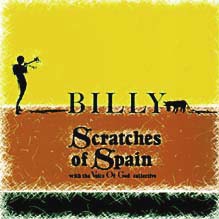
|
SCRATCHES OF SPAIN
by Richard Russell
Jazz lovers have disintegrated into so many factions
over the years that
they make the socialists look like a well-drilled
regiment. Forty years
ago, the distinctly unsavoury figure of Miles Davis was
considered an affront
to the loyal followers of Chris Barber and Monty
Sunshine, who, of course
themselves were playing an earlier period’s brothel
music. By 1987 a few
more factions were in the mix. There were people who
only liked Herbie
Hancock along with people who said no ‘real’ jazz had
been made since the
advent of Herbie Hancock. Miles by now was an
unassailable and moderately
saleable icon who could do no wrong. It was Miles who
"invented" jazz-rock,
funk-rock, jazz-funk-rock, and
funk-jazz-rock-jazz-standing-at-the-back
-and-let-the-kids-get-on-with-it-rock. All his later
recordings were "ground-breaking"
while all his earlier work was "seminal". Against this
backdrop ‘Sketches
of Spain’ is hailed as a jazz classic, particularly by
people who like
Horlicks with their hash-cookies. As far as I can
gather, neither Miles
nor his arranger Gil Evans had ever been to Spain.
Further, I still wonder
whether a tightly-scored medley of tunes by de Falla and
Rodrigo is jazz
at all. Miles and Gil had already tried more
conventional middle-sized
group work on the ‘Birth of the Cool’ sessions, at the
time a commercial
flop; they had even ploughed the depths for
forward-thinking black artists
with an album of songs from Gershwin’s ‘Porgy and Bess’.
My suspicion is
they did a Spanish album in much the way modern function
bands do a ‘Latin’
number to pad out their set. The result was beautiful
music, but maybe
we’d better leave it at that.
Billy Jenkins’ ‘Scratches of Spain’, like any decent
album, works on different
conceptual levels. Part homage to a Spanish tour with
Ginger Baker; part
debunk of polite jazz sensibilities; in a big part simply
the best album
Billy could make at the time with the best musicians
available. It is in
every sense a ‘contemporary’ album: referential but rooted
in a keen observationalism
so often mistaken for pure slapstick. Billy doesn’t call a
song ‘Benidorm
Motorway Services’ just to get a laugh when he announces
it at gigs. The
tune is deeply and philosophically about Benidorm motorway
services and
to miss that is to miss the point. Another point must be
made about technique.
Parody is meant to sound easy and stupid. In fact you have
to be pretty
good to intentionally sound ‘bad’ for musico-impressionist
purposes. Billy’s
music is never a row, although occasionally it is a highly
organised impression
of a row. The guys in Billy’s bands comprise a who’s-who
of top European
jazz talent, and it is down to Billy’s unique gifts as
composer and musical
director that he always gets them to sound, well, very
Billy Jenkins. He
gets unfair comparisons with Spike Jones and Victor Borge.
What he does
on ‘Scratches’ shows him on the trail of Sun Ra, Mingus,
and the later
Ellington. Jazz as a concert art form, drawing for its art
upon the varied
influence of ‘real’ life. Billy’s jazz music always
betrayed a sophistication
beneath the jokes. A musical joke is a pretty
sophisticated thing in any
case.
Gil Evans’ Spain is atmospheric, whimsical, full with
bass flute trills
and arid French horn horizons, not completely unlike
Clint Eastwood having
breakfast in a Mexican hotel. Billy’s album shouts
modern life at you from
the off, with a high-energy funk and some ballsy
uplifting lead guitar
work. Wailing keyboards, more James Brown than Bob
James; a lip-trill or
two on a fancy trombone; and then two or three choruses
of flowing sax.
This is jazz that puffs and sweats; the most ‘non-cool’
music you’re ever
likely to hear. The second track, ‘Cuttlefish’, combines
off-the-wall percussion
with a deliberate swipe at the Gil Evans sound using
flutter-tongued reeds
and Milesish muted trumpet. This is joined by some
movie-house organ and
the mood continues, slightly submarine and just a bit
menacing. ‘Barcelona’
is where Miles Davis meets his dopple-ganger, his
scruffy pissed brother-in-law,
his coup pas de grace. Anyone familiar with ‘Sketches of
Spain’ recalls
how wistful Miles is interrupted by a full marching
band, arpeggiated trumpets
and snare-drums. In Billy’s ‘Barcelona’ we get the
wistful lilting Dai
Pritchard on clarinet, interrupted by a ragged mocking
tune, as diabolical
as it is hilarious. A few Dwayne Eddy impersonations
later, and the guitar
and tenor sax duet with an eloquence gloriously at odds
with the ebbs and
flows of the ensemble. The percussion fades beneath a
clarinet reprise,
and what was the end of side one on the original vinyl
tip-toes out as
you wonder whether you can ever take Miles’ ‘Sketches’
seriously again.
|

